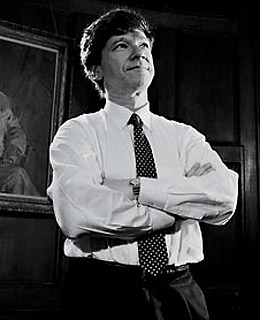
Some academics are said to live in ivory towers. Jeffrey Sachs is a pioneer of the mud-hut school of thought. He is an economist who loves statistics because they are pictures of people's lives — people, in many cases, for whom economics means working out how to feed a family on less than a dollar a day. The equations in Jeff's head interest him because they reveal how we might be able to change the world we inhabit.
The title of his new book, The End of Poverty, sounds lofty. It is lofty. But a poverty of ambition isn't going to prevent the deaths of 30,000 children daily from malaria, a preventable and treatable disease, or from hunger in a world of plenty. Jeff's hardheaded analysis does not stop at why and how to do all this. He's just as concerned with who and when. Governments, take cover: he knows where you park your cars, and he's not afraid to break into them.
When this man gets going, he's more like a Harlem preacher than a Boston bookworm. I first met Jeff in 1999 at Harvard University when I was taking a crash course on the subject of debt cancellation. He had a reputation for being brilliant, controversial, passionate. I was struck by his uncanny ability to communicate arcane, complex economic policy and by his punk-rock instinct to question the status quo. He set out to turn upside down the conventional economic wisdom that nothing could be done about poor countries sinking under the burden of old debts. He was proved right. For those countries that were owed money, debt relief cost next to nothing, and no one noticed. For those countries that had next to nothing, it provided doctors, teachers, schools and clinics. The vision Jeff, 50, outlines in his latest book has far greater payoffs — ultimately a more equitable and safer world. In the 21st century, the least we can do is put it to the test.
Bono, lead singer of U2, co-founded DATA, a group that raises awareness on the issues of debt, AIDS, trade and Africa
From the Archive
The End of Poverty: In a world of plenty, 1 billion people are so poor, their lives are in danger. How to change that for good